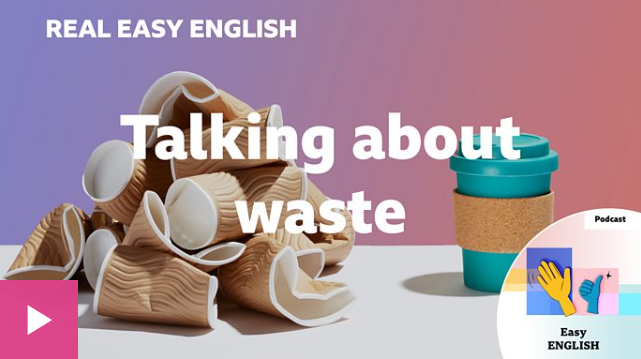Introduction
Neil and Beth have a real conversation in easy English about rubbish and recycling Learn to talk about the things you use and the ways you try to reduce waste.
Vocabulary
waste
something that you no longer need, or use without needing to
recycle
collect rubbish in order to make materials that can be used again
single-use plastic
plastic materials that are used once and then thrown away, such as food wrappers
rely on
need in order to function
cut back on or cut down on
reduce
Transcript
Neil
Hello and welcome to Real Easy English. In this podcast, we have real conversations in easy English to help you learn. I’m Neil.
Beth
And I’m Beth. Did you know you can watch a video of this podcast on our website? Go to bbclearningenglish.com.
Neil
Hi Beth, how are you today?
Beth
I’m very good, thank you. Neil, how are you?
Neil
I’m very good. What are we talking about?
Beth
Well, today we are talking about waste. So that’s what we call things that we don’t want any more, like rubbish or things that we’ve used, and we now don’t need them. So, for example, after I’ve eaten some crisps as a snack, the, the packet is rubbish, it’s waste.
Neil
Are you good at dealing with waste?
Beth
I think so. I mean, at home we recycle. We can recycle glass, plastic, metal, card. All the usual things that we recycle here in the UK. What about you?
Neil
Yeah, I do what I’m supposed to do. So we have a separate bin for different things. For plastic and for glass and for paper and for food.
Beth
Yeah.
Neil
When I was a kid, everything went in the same bin.
Beth
Really?
Neil
Yeah. And now that seems really crazy and really bad.
Beth
Yeah.
Neil
So I think we are better now at dealing with waste, but probably there’s more things we could do.
Beth
Yeah, I would think so. Yeah. Something that I do as well in, is when I’m in a supermarket, I try to not buy fruit and veg that’s wrapped in plastic. I’ll always try and buy the individual products like apples on their own. Or, you know, a courgette. You don’t need a courgette that’s wrapped in plastic.
Neil
Well, that’s a good idea, but sometimes it’s actually quite difficult to find things that aren’t covered in plastic because we rely on plastic so much.
Beth
Yeah, I know that is true.
Neil
You know what people do these days, which is great that they didn’t used to do. Carry reusable water bottles.
Beth
That’s true.
Neil
Almost everybody carries a bottle. And just a few years ago, people bought plastic bottles of, of water all the time.
Beth
Yeah, I remember when I was teaching in a classroom and I’d sometimes have students. They would come to London from all over the world, and every day they would go to a supermarket and buy a plastic bottle. And I used to, I used to say sometimes, you know ‘why, buy a reusable one’ and then you’re not using this plastic all the time.
Neil
Yeah. We have a word for that, don’t we? Single-use plastic.
Beth
Yeah. So we have to try and avoid single-use plastics. What about water? So water waste. I really like having a bath just to relax, but sometimes I feel really guilty about it because it’s using up quite a lot of water.
Neil
Yeah, I prefer showers, which is good because they use less water.
So, Beth, is there anything that you are planning to do to cut down further on the waste that you create?
Beth
I should probably have fewer baths. I mean, I maybe have one a week, so… I mean, I shower too, of course. But maybe I could have a bath less often. Find other ways of relaxing which are less wasteful. What about you? Anything you want to cut back on?
Neil
Yeah, I think, we talked about single-use plastic. You know, clingfilm, the very thin, like, sheet, sheets of plastic that you wrap food in.
Beth
Yeah.
Neil
I always feel bad when I use that stuff, but it’s also really convenient and does its job well keeping a sandwich together or whatever. But I don’t like it, so I want to cut down on my use of clingfilm.
Let’s recap the vocabulary we heard in this conversation. We had waste. Waste is things that are unwanted like rubbish, and we can also describe something as a waste when someone uses something they don’t need to, or they throw something away after not using it. So for example, when my kids don’t finish their dinner, that’s a waste.
Beth
We had single-use plastics. These are plastic materials that we use once and then throw away. So for example, food wrappers and shopping bags.
Neil
We heard recycle which means to collect rubbish in order to make materials that can be used again. We can also describe something as recyclable. It means it can be recycled. It can be used again.
Beth
And we heard some common phrasal verbs that we use when talking about the environment. So we had to rely on which means need something in order to function. For example, we rely on plastic a lot in our daily lives.
Neil
We can also say cut down on which means to reduce something. And we also hear cut back on. So for example I want to cut back on single-use plastic.
Beth
That’s it for this episode of Real Easy English. If you want to learn more phrasal verbs about the environment, then Georgie has made a whole video on this. You’ll find the link in the notes below.
Neil
And next time on Real Easy English, we’ll be talking about confidence. See you then.
Beth
Bye.
